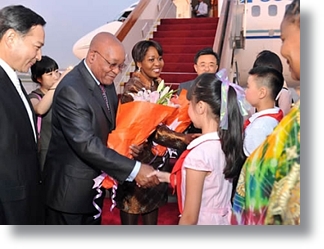Will the SA-China Trade Agreement Benefit Consumers?

 |
| Zuma is received in China Photo courtesy |
Throughout the world, what bothers these industries is that Chinese manufacturers can produce clothing and textiles more cheaply than they can. As a result, domestic manufacturers call on their governments for protections such as taxes on Chinese clothing and textiles, or, in extreme cases, an outright ban on those Chinese goods. SA producers are one group among many struggling to compete with the Chinese and, like others elsewhere, are calling for the institution of myriad measures to protect ‘fragile’ local industries.
In January 2007, the SA government introduced quotas restricting imports of Chinese textiles and clothing for a period of two years. The quotas, or safeguards as they often have been called, were put in place to give SA manufacturers a window period in which to become more competitive. But, just as evidence in the past has shown, protected industries never become more efficient because the protection they are given takes away any incentive they might have had to do so. Instead, the results are persistent appeals for that protection to be extended. Therefore, in 2009, after the window period expired, it came as no surprise when industry bodies claimed the quotas “have not made the struggling clothing and textile companies more competitive because the two year period [was] too short for them to earn a return on investments in new machinery”.
Quotas are a particularly damaging form of intervention because governments arbitrarily decide the level of control deemed necessary to protect local manufacturers, a task that no one can perform due to the dynamic nature of the demand for goods. In the interim, poor consumers, those at the low end of the market, the ones who have typically benefited from cheaper imports, have to pay higher prices for the goods they want. For price sensitive individuals at the low end of the market, even a small increase in price for essential commodities can have devastating consequences.
As quotas are not as transparent as a tariff, which is simply levied on goods entering the economy, they often open the door to corruption. Customs officials are given the power to decide which importer’s goods will be allowed entry and the quantities they will be entitled to import. Influential importers may receive preference over others. Moreover, quotas are set without any scope for changes in demand and governments are usually slow to react to changing circumstances. Some importers, realising the potential to fill a gap in the market, may resort to smuggling to accommodate the increased levels of demand. Subsidies and artificial barriers such as tariffs and quotas harm the majority of South African citizens. If the government really wishes to help South African clothing and textiles manufacturers without harming the rest of the country’s citizens, it needs to make the environment in which the manufacturers operate more conducive to doing business. Taxes imposed on clothing and textiles manufacturers should be substantially reduced, as well as the cost of doing business in SA.
Sadly, the trade unions, out to safeguard unionised local jobs, have forced 85 clothing manufacturers in the Newcastle area of northern KwaZulu-Natal to shut-up shop, potentially jeopardising the jobs of at least 9,000 people. They did this because their employers were not paying them the minimum wage of R324 per week and were thus denying them “decent work.” To be denied the right to work, in an area where, according to the Newcastle Municipality, the unemployment rate is approximately 60 per cent, is shameful.
To make matters worse, a further 386 non-compliant manufacturers have apparently been identified by the unions and competing clothing manufacturers. Their closure could affect as many as 15,000 jobs. According to Alex Liu, the chairman of the Newcastle Chinese Chamber of Commerce, “The lowest paid worker in our factories earns R250 a week and the highest R500. But they are also demanding that we pay the minimum wage of R324 a week and it’s impossible for us to do that because we are competing with imports from China and the (cut, make and trim) price from our customers will not sustain us if we paid R324 a week.”
Trade unions in this country are not interested in ordinary South Africans. They lobby to protect unionised jobs from foreign imports even if it is at the expense of the poor. That is their job, like any ‘business’ they seek to maximise profits and the best way to do this is to protect their members from potential competition – be it foreign or local. The unseen victims are ordinary poor South Africans who are forced to pay higher prices for clothing or to remain idle with little or no understanding as to why they cannot get a job.
The SA government cannot afford to heap highly concentrated benefits on a select few – it must start to think of the majority of South Africans who benefit from cheap clothing and allow those who want to work to do so under whatever conditions they choose for themselves.
By Jasson Urbach,
An economist with the Free Market Foundation.
